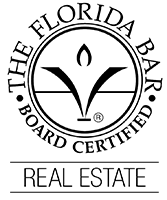Florida Real Estate Law Frequently Asked Questions FAQ
Here are some frequently asked questions and answers regarding Florida real estate law by St. Petersburg Florida attorney James W. Martin who is Board Certified in Real Estate Law by The Florida Bar Board of Legal Specialization. This is provided for general information and not specific legal advice.
For additional information, see James W. Martin’s legal forms books “Florida Real Estate Sales Contracts” and “Florida Real Estate Lease Agreements“, which are available on Amazon and Barnes and Noble.
Title insurance should be maintained equal to the fair market value of the real estate. Some people remember to increase homeowner’s insurance coverage when they receive their annual premium statements, but title insurance premiums are paid only when the policy is issued at the time of purchasing the real estate. Title insurance can be obtained and increased by a licensed title insurance agent in Florida.
Joint tenancies are any form of ownership involving more than one owner, such as joint tenancy with full rights of survivorship, tenancy in common, and tenants by the entirety. Joint tenancies may be held in many types of assets in Florida, including real estate, bank accounts, stocks, etc. Some forms of joint tenancy avoid probate and some do not.
Assets subject to Florida law that are held jointly with full rights of survivorship generally pass automatically by operation of law to the surviving joint owners and do not require probate if there is at least one surviving joint owner. Real estate, bank accounts, stocks, and mutual funds are frequently held as joint tenants with full rights of survivorship.
Joint assets held as tenants in common do not avoid probate under Florida law when one of the joint owners dies. Assets subject to Florida law that are held jointly but not with full rights of survivorship and not as tenants by the entirety may be considered held as tenants in common.
Yes, assets held by a husband and wife as tenants by the entirety pass automatically by operation of law to the surviving spouse and do not require probate on the first death in Florida. In addition to probate avoidance, separate creditors of just one spouse cannot reach tenancy by the entirety assets in Florida. This form of ownership is sometimes called tenancy by the entireties.
One disadvantage of jointly-held property is that probate is not avoided when the last joint owner dies. Probate will usually be required upon the death of the last surviving joint owner. Another disadvantage of joint ownership of property in Florida is that it constitutes true ownership. This might mean that a joint owner could withdraw, sell, borrow against, or convey his or her interest in the joint asset without approval of the other joint owners. It also might mean that creditors of one joint owner could reach that joint owner’s interest in the property (except for tenancies by the entirety).
Joint ownership does not avoid a guardianship in Florida. For example, if a married couple owns a home and one of them becomes incapacitated, necessitating the sale of the home to pay medical bills, a guardianship might be required because one spouse alone cannot sign a deed conveying the home. A durable power of attorney might be used to convey the home, but not everyone has one.
Adding a child’s name as a joint owner of a home in Florida could adversely impact the homestead status of the home for tax and other purposes. It could also constitute a gift to the child possibly triggering the federal gift tax laws. And it could also be problematic because the child’s creditors could reach the child’s interest in the home. Similarly, the child’s spouse could claim an interest in the home jointly held with a child if the child divorces. Therefore, it is generally not advisable to add a child’s name as joint owner of a home in Florida.
Yes, Florida real estate can have construction liens against it. Florida Statutes Chapter 713 grants a construction lien, also called a mechanic’s lien, to any person furnishing labor or materials for the improvement of real property. Under this law, even if the owners pays the general contractor the full construction price, if the owner does not comply with the requirements of the Florida construction lien law, the owner may end up paying construction liens filed by unpaid subcontractors and suppliers. The law has the effect of shifting the risk of nonpayment to the owner if the owner fails to comply with the lien law.
The basic steps for an owner of real property in Florida to comply with the construction lien law are: 1) Sign a written contract with the general contractor that sets forth price, payment and scope of work terms. This is a legal document that should be prepared or reviewed by the owner’s lawyer. 2) Record and post a Florida notice of commencement in compliance with the Florida Construction Lien Law. The owner’s lawyer should prepare or review the notice of commencement. 3) Treat all notices to owner with care. The Florida notice to owner tells the owner the names of the subcontractors and suppliers who are working on the job. 4) At each payment request, the contractor should provide the owner an affidavit of payment and a lien waiver and release from the contractor and everyone who has sent notice to owner. 5) The owner should withhold 10% from each progress payment. This is called a retainage. It must be written into the construction contract that the owner can withhold this amount. 6) The owner should obtain a title search and updated title insurance commitment before making each progress payment and the final payment to verify that no liens have been recorded. If a lien has been recorded, the owner’s lawyer needs to advise how to handle it under the circumstances.7) Some of these steps can be avoided if the owner requires the contractor to provide a payment and performance bond. This should be written as a requirement in the contract in order to be legally binding. There is premium that the contractor must pay to the insurance company (surety) that issues the bond, and the contractor will add that premium to the contract price, so it will cost the owner more to have the job bonded than not bonded, but it might be worth the premium.
Other Practice Areas
This page relates to one of the practice areas of St. Petersburg, Pinellas County, Florida lawyer James W. Martin. For other practice areas, click here.
Contact
If you have the need for a Florida wills, trusts and probate attorney who has expertise in Florida real estate law, you may use the contact form below or call James W. Martin directly at 727-821-0904 or email him at jim@jamesmartinpa.com .
The text on this page was written by James W. Martin, Esq. and was last updated on September 15, 2024.






